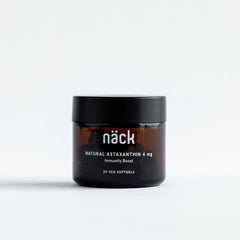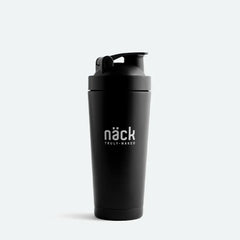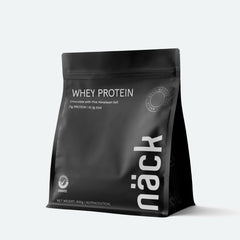The most common supplement used globally and in India is the Multivitamin. We dare to ask why!
History of Multivitamins
Multivitamins were the first ever supplement made to bridge nutritional gaps in the diet. You’d be interested to know that vitamins were first discovered more than a century ago! The journey began in the early 20th century, a period marked by rudimentary understanding of diseases and nutrition. Prevailing thought attributed illness primarily to poor sanitation or unknown causes.
The vitamin discovery was the ‘Aha!’ moment! Modern vitamin history began when scientists who were trying to find the root cause of certain diseases discovered that food contained more than three nutrients (carbs, protein, fats). Casimir Funk, coined the term “vitamine” in a 1912 scientific paper, and the word later became “vitamin.” It was found that intake of these vitamins is essential for vitality and overall body functionality.

A 1977 ad for a vegetarian multivitamin
History of Multivitamins

The World Health Organization recommends consuming 400 grams of fruits and vegetables daily. However, over 80% of Indians fall short, opening doors to chronic diseases. The per capita household vegetable and fruit intake was found to be 145 and 15 g, respectively, for rural India, and 155 and 29 g for urban India, as per the nation-wide NSSO Household Consumer Expenditure Survey 2011–2012. A significant portion of this intake came from energy-dense food items; potatoes and bananas for vegetable and fruit intake respectively.
The situation is worsened by a 15% reduction in essential vitamins and minerals in food crops due to rising CO2 levels and soil sterilisation by pesticides.
Multivitamins and mineral supplements have thus emerged as critical tools in the quest for holistic health and well-being, offering a pragmatic solution to meet the nutritional needs of a diverse and growing population. By bridging the nutritional gap, Multivitamins and Mineral supplements not only support optimal body functionality but also contribute significantly towards enhancing overall health amidst environmental and lifestyle challenges.
Are All Multivitamins Same?
When exploring the vast world of multivitamins, it becomes apparent that not all are created equal. Several key factors differentiate one multivitamin from another, affecting their efficacy and suitability for different individuals.

Nutrients In Bioavailable Forms
Bioavailability is a critical factor in the effectiveness of multivitamins. It refers to the proportion of a nutrient that is absorbed from the diet and used for normal body functions. Vitamins and minerals come in various chemical forms, some of which are more readily absorbed and utilised by the body than others. For instance, 5 Methyltetrahydrofolate is a more bioavailable form of Vitamin B9 rather than the commonly known Folic acid. When choosing a multivitamin, look for one that specifies its nutrients are in highly bioavailable forms.
Competing Nutrients
Certain vitamins and minerals can interfere with each other's absorption when taken together. This is known as nutrient competition. For example, calcium can hinder the absorption of iron, and Vitamin B12 can interfere with Vitamin C absorption. An effective multivitamin is formulated in a way that minimises these antagonistic interactions, ensuring that you get the maximum benefit from each nutrient.
RDA Value
Recommended Dietary Allowances (RDA) are the levels of intake of essential nutrients that are considered to meet the nutritional needs of healthy individuals. A quality multivitamin should provide close to 100% of the daily values for most vitamins and minerals, ensuring you're getting an adequate but safe amount of each nutrient. However, it's important to note that RDAs can vary by age, sex, and life stage, so individual needs may vary.
Essentials only - ditch the excess!
A good multivitamin doesn't overdo it with excessive quantities of nutrients or unnecessary ingredients. It focuses on providing essential vitamins and minerals in the right proportions. More isn't always better when it comes to vitamins and minerals, as some can be harmful in high doses. Furthermore, avoid multivitamins with lots of fillers, additives, or artificial ingredients. The simpler and more focused on essential nutrients, the better.
Dual Multivitamin and Minerals Formula For Superior Absorbency

Pioneering a first-of-its-kind formulation in India, our nutraceutical experts dedicated over a year to craft the most effective multivitamin formulation with superior absorbency. It provides a broad spectrum of 25 essential nutrients in two complementary formulas. By separating the micronutrients that compete for absorption sites into morning and evening doses, it supports superior absorbency of each nutrient, so you get more of what you need, when you need it!
With a selection of natural and active forms with beneficial quantities of each nutrient - we ensure a safe and effective Multivitamin & Mineral supplement to support and promote your overall health and well-being.
25 essential vitamins and minerals in our formulation
-
Pro Vitamin A (from Beta Carotene)
A fat-soluble vitamin that helps maintain eye health, and support immune function and wound healing. -
Vitamin B1 (as Thiamine Mononitrate)
Vitamin B1 is essential for the functioning of the heart, muscles and nervous system. It is involved in producing energy, as well as synthesising DNA and RNA, the nucleic acids that carry our genetic material. -
Vitamin B2 (as Riboflavin-5 Phosphate, Na)
Vitamin B2 helps produce red blood cells and metabolise toxins in the liver. and maintains healthy skin, eyes and nerves. -
Vitamin B3 (as Nicotinamide)
Vitamin B3 plays a role in repairing DNA, keeping nerves healthy, and controlling cholesterol levels. -
Vitamin B5 (as Calcium D-Pantothenate)
Used to make coenzyme A (CoA that helps enzymes to build and break down fatty acids as well as perform other metabolic functions, and energy production. -
Vitamin B6 (as Pyridoxyl-5 Phosphate)
Vitamin B6 is involved in glycogen breakdown, nervous and immune system function, and the formation of neurotransmitters and steroid hormones. We use Pyridoxyl-5 Phosphate - the most active form of the vitamin. -
Vitamin B7 (as D-Biotin)
Vitamin B7 is involved in energy production, as well as DNA replication and transcription. It supports hair, skin and nail health. -
Vitamin B9 (as 5 Methyltetrahydrofolate)
Folate is important for cell growth and the production of DNA and red blood cells, helps to form new proteins and is also essential in foetal brain development. We use the active form 5-MTHF instead of folic acid to prevent negative effects of unconverted folic acid in the peripheral circulation. -
Vitamin C (as Ascorbic Acid, from Acerola Cherry)
Vitamin C also helps build collagen, keeps skin and joints healthy, boosts immunity, enhances the absorption of iron and produces neurotransmitters like serotonin that regulates mood and energy levels. -
Vitamin D3 (from Lichen)
Vitamin D helps with calcium absorption, immune system function, and regulating glucose tolerance. -
Vitamin K2 (as MK7 Menaquinone)
Vitamin K2 is involved in normal blood clotting and also plays a role in keeping bones healthy. -
Choline (as Choline Hydrogen Tartarate)
It’s involved in building cell membranes and neurotransmitters (like acetylcholine, an essential neurotransmitter for muscle impulses). It may also help lower inflammation. -
Copper (as Copper Gluconate)
Copper is an antioxidant and is also involved in energy production, collagen formation, and protein synthesis. -
Iodine (as Potassium Iodide)
Iodine is essential for healthy thyroid function and the production of the thyroid hormones T₃ and T₄. -
Iron (as Ferrous Fumarate)
Iron helps to form haemoglobin, red blood cells, and blood vessels. It’s essential for helping transport oxygen throughout the body and energy production in mitochondria. -
Magnesium (as Magnesium Hydroxide from SeaWater)
Metabolises carbohydrates and fats, synthesising proteins and DNA, and helping to relax and repair muscles. It boosts heart health, bone strength, energy production in cells and regulations of neurotransmitters, which affect mood and mental health. -
Vitamin B12 (as Cyanocobalamin)
Vitamin B12 is involved in DNA synthesis, and also helps to form and maintain healthy blood and nerve cells. -
Vitamin E (as D-AlphaTocopheryl, from Sunflower Seed)
Vitamin E is a potent antioxidant, and is also involved in cell-to-cell communication. -
Boron (as Boron Proteonate)
Boron from Boron Proteinate has impacts on several metabolic processes. It is widely used as a nutrient in supplements which gives beneficiary action in both arthritis and osteoarthritis. -
Calcium (as Calcium Carbonate from Seaweed)
Calcium is the most common mineral in our body. It’s involved in muscle contraction, teeth and bone formation, and hormone secretion. -
Chromium (as Chromium Picolinate)
Chromium plays an important role in glucose and fat metabolism and supports the role of insulin. -
Manganese (as Manganese Gluconate)
Manganese is an antioxidant and is also involved in carbohydrate, amino acid, and cholesterol metabolism. -
Molybdenum (as Sodium Molybdate)
Molybdenum plays a role in nutrient metabolism, as well as the breakdown of drugs and toxins. -
Selenium (as Selenomethionine)
Selenium is an antioxidant, and also plays a role in thyroid hormone metabolism. -
Zinc (as Zinc Gluconate)
Zinc is involved in growth and development, neurological function, reproduction, immunity, cell structure and function, and more.













